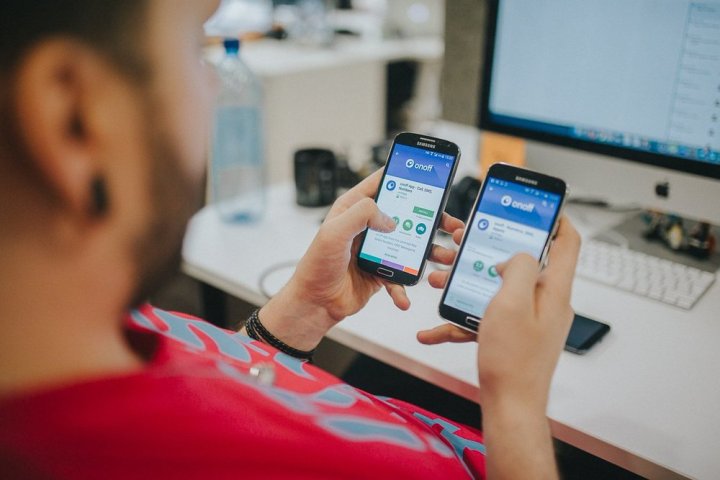
Onoff was founded by Greek-Algerian professional vert skater Taig Khris, an athlete-turned-entrepreneur who won the X Games Inlite Vert event with the first double backflip in X Games history. In 2010, he broke the world record for the highest inline skate jump by dropping from the first floor of the Eiffel Tower onto a massive ramp below, and set a new world record in 2011 for roller skating down a 95-foot ramp in front of the Sacre Coeue Basilica in Paris.
But after repeatedly breaking legs and arms while preparing for events, he decided it was time for a change. It was while lying in a hospital bed that Khris conceived of Onoff: a phone company that stored numbers in the cloud. “I wanted a challenge. I wanted to reinvent the industry,” he said. “Phone numbers are locked inside the SIM card. I wanted to invent a new standard.”
Khris, despite lacking a background in telecoms, invested $6 million to hire a team of engineers to build a telecom network from scratch. “We basically locked ourselves in a room for three years,” he said.
The result of the team’s hard work was Onoff, a service that supplies working telephone numbers to customers in ten countries. But unlike apps that do the same, Onoff lets its subscribers send texts and place calls to both traditional landlines and cellphones.
That’s because there’s more to Onoff is than just a mobile app. It’s what’s known as a mobile virtual network operator (MVNO), a carrier that works atop existing mobile networks to interconnect with major service providers like Sprint, Verizon, AT&T, and T-Mobile. “We’re totally different than every mobile application,” Khris said. “Our technology is unique because it’s compatible with every major carrier and operating system, allowing more than 98 percent of smartphone owners in the U.S. to use Onoff.”
The details are a little technical, but from a service perspective, having MVNO status means that Onoff can provide inexpensive numbers that work almost anywhere in the world. Onoff users can call and message each other for free using an internet connection, but for $3 a month, subscribers get a number that works across smartphones, tablets, and even cell-enabled smartwatches. Onoff is even launching a web portal in the near future that will let customers place calls from computers.
And Onoff applies intelligence to numbers. Every number has a cloud-based voicemail inbox. Subscribers can schedule text messages, or arrange for the service to reply automatically to messages from certain numbers. And Onoff supports “selective airplane mode,” a feature which allows customers to selectively “switch off” features like SMS, voicemail, and calls on demand. “If you’re in a meeting and you want to receive messages but not calls, it’s really useful,” Khris said.
There’s more to come. A future Onoff app will let subscribers essentially password-protect their secondary numbers: The number, along with its associated text messages and call log, remains concealed from view until the correct password is entered. “It’s good for someone who has a double life,” Khris said. And eventually, subscribers in the U.S. will be able to port their existing numbers to Onoff’s service without charge. (Number porting is already live in France.)
Onoff’s service isn’t without limitations, though. Because it relies on a cellular connection to handle phone calls, its usage is constrained by cell plan minutes — if a user has two hours of calling each bill cycle, for instance, they’ll only be able to use Onoff for those two hours. And international calling isn’t free — the rates vary by country.
But the appeal, Khris said, is far more flexibility than most carriers can afford. “No company in the world can do what we’ve done,” he said. “And we’re planning to grow.”
It’s already a force to be reckoned with. Onoff’s active subscribers number more than 250,000, and the company plans to expand to as many as 30 countries over the next few months. “It’s the future of telecom,” Khris said. “It’s like a world championship, in my mind. If you don’t do it fast, the incumbents are going to come and take your place.”


